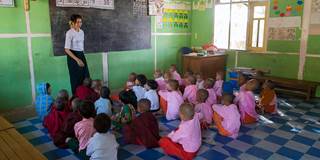After a half-century of neglect under military rule, Myanmar's education system has fallen apart. Prospects for sustaining the country's fragile political transition hinge not just on the resolution of the Rohingya crisis in Rakhine State, but also on the country's progress on ensuring access to quality schools for all students.
GENEVA – The violence that has ravaged Myanmar’s Rakhine State underscores the challenges the country faces on its bumpy road from military rule to democracy. The country is confronting a deep crisis, and urgent action is desperately needed to prevent further violence and assist the huge numbers of refugees and internally displaced people. To address the political, socioeconomic, and humanitarian challenges fueled by the crisis, the Advisory Commission on Rakhine State, chaired by Kofi Annan, recommends urgent and sustained action on a number of fronts to prevent violence, maintain peace, and foster reconciliation.

GENEVA – The violence that has ravaged Myanmar’s Rakhine State underscores the challenges the country faces on its bumpy road from military rule to democracy. The country is confronting a deep crisis, and urgent action is desperately needed to prevent further violence and assist the huge numbers of refugees and internally displaced people. To address the political, socioeconomic, and humanitarian challenges fueled by the crisis, the Advisory Commission on Rakhine State, chaired by Kofi Annan, recommends urgent and sustained action on a number of fronts to prevent violence, maintain peace, and foster reconciliation.